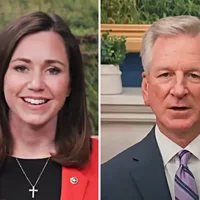State Sen. Larry Stutts (R-Tuscumbia) seeks to curb some perceived abuses by Pharmacy Benefits Managers (PBMs), companies that act as intermediaries between health insurers, pharmaceutical companies and consumers.
According to Stutts, his Senate Bill 99 (HB99) would remedy the PBM arrangement that threatens independent pharmacies.
He laid out his objective during an appearance on Mobile radio FM Talk 106.5's "The Jeff Poor Show."
"The independent pharmacists across the state are really struggling," he said. "And the fact is, I look at these things simply — and the PBMs don't really bring anything to the system. You know, there are only so many healthcare dollars that are split up between pharmacists, doctors, hospitals, nursing homes, whatever. And the PBMs are an unnecessary middleman that does not save anybody any money. You know, if you look back several years, I think around 2007 or so, the PBMs started vertically integrating their system where they own pharmacies. So the fact is, the pharmacies that they own are competing with independent pharmacies. And the PBM gets to set the price for all of the pharmacies within their network. And they set the prices for independent pharmacies below what the acquisition costs are on many of their claims. I've had the pharmacies tell me that they lose money on about half of the prescriptions that they fill."
Stutts continued, "And so we're simply trying to remedy that situation to, you might say, level the playing field because independent pharmacies, particularly when you look at rural Alabama, they're a vital part of the health care system in small towns, in rural areas, and they offer services that mail-order pharmacies don't offer. If you get a prescription for a sick child on Friday afternoon, and you have to use a mail-order prescription or a mail-order prescription service, you're not going to get the medicine until Tuesday or Wednesday of the next week. And your local pharmacy would fill it then, they would open up on Saturday. There are a lot of independent pharmacists that will meet a client at the store after hours to fill a prescription. And if you drive everything to mail-order pharmacies, you totally take that possibility out of the equation. But the bottom line is that we're not asking for the moon. We're just asking to level the playing field and make it be fair. And there's plenty of data that they pay more to their own pharmacies within their vertically integrated network than they do to independent pharmacies. And it doesn't save the consumer any money. Like I said, they're reaping huge profits out of the system. And all they're doing is steering the people to an out-of-town pharmacy or to a mail-order pharmacy or to one of their own pharmacies by paying those pharmacies more than they pay the others because they get to set the prices within the network."
The Colbert County lawmaker said PBMs were the financial beneficiaries of a scheme that awarded so-called rebates to PBMs for requiring health insurers to fill prescriptions with higher-priced name-brand pharmaceuticals rather than a lower-cost generic equivalent.
"And the two things that are important, and I know we don't have much time — but the thing that's unique about the bill, Senate Bill 99, the bill that I have is it mandates that the rebate goes to the customer, not the PBM. And one of the things that drives up the cost of medication is when they don't allow a generic equivalent to be used because the PBM gets a rebate from the manufacturer to require that the name-brand medication be the one that's on their formulary. So, if you're having a prescription filled, they can mandate that your generic equivalent is not on the formulary, so you have to pay the higher price. The consumer has to pay the higher price for that drug. And then the PBM, in return, gets a rebate from the company that makes the name-brand drug. And I mean, they called it a rebate. I would call it a kickback.
"But regardless, we in this bill require that the rebate goes back to the customer. And that could be the person is having the prescription filled, or at least it would go back to their insurance plan at the company that they work for, which would help keep their premiums down. So the idea that this is going to drive up cost is absolutely not true. It's going to drive down cost because the rebate is going to go back to the person that's paying the money and not to the PBM. And then the second thing that's unique about my bill is it has enforcement provisions that allows the Department of Insurance, it specifically says the Department of Insurance has explicit authority to enforce the provisions of this act. So right now, you know, there are a lot of ways to get around it. And so we have an enforcement provision and we require that the rebate go directly back to the consumer and not to the middleman."
Jeff Poor is the editor in chief of 1819 News and host of "The Jeff Poor Show," heard Monday-Friday, 9 a.m.-noon on Mobile's FM Talk 106.5. To connect or comment, email jeff.poor@1819News.com or follow him on Twitter @jeff_poor.
Don't miss out! Subscribe to our newsletter and get our top stories every weekday morning.










